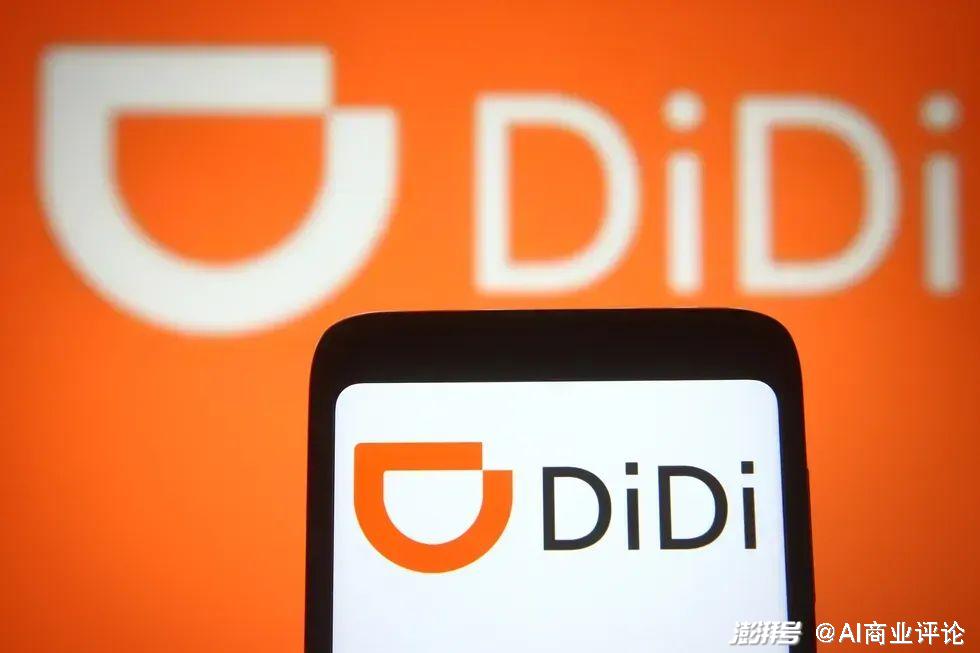
Didi is entering a new stage of development of "breaking out of the cocoon and becoming a butterfly".
The latest quarterly earnings report from Didi shows that Didi has achieved its best performance in history. Specifically, while its business and revenue continued to grow and reached a record high, it also ushered in a bright harvest on the financial level: it achieved its first single-quarter profit since delisting from the New York Stock Exchange.
More importantly, Didi’s business structure has also further matured. One of the most typical examples is that Didi’s corporate strategy will further "focus on mobility services", according to Cheng Wei, chairperson and CEO of Didi.
For a travel platform company like Didi, doing something and not doing something is a very challenging business choice. At present, the strategic focus on travel services has pointed to Didi’s "doing something", and Didi’s "doing something" has largely pointed to autonomous driving.
For the current Didi, this is undoubtedly a wise choice.

Towards a rare positive business cycle
From a financial standpoint, Didi is approaching a business cycle based on a mobility service system like never before.
According to Didi’s official financial report for the third quarter of 2023 released on November 13, Didi’s revenue in the third quarter was 51.40 billion yuan, reaching a new historical high and growing by 25% year-on-year.
Among them, the China Mobility business segment achieved revenue of 46.649 billion yuan, an increase of 26.6% year-on-year; the International business segment achieved revenue of 2.034 billion yuan, an increase of 28% year-on-year.
Judging from the order situation, Didi’s order volume in the three quarters continued the growth trend of the previous two quarters as a whole, and the total order volume of the core platform reached 3.579 billion orders, an increase of 34% year-on-year. Among them, the total order volume of China’s travel business was 2.878 billion orders, an increase of 32% year-on-year; the total order volume of international business was 701 million orders, an increase of 43% year-on-year. In this way, the average daily order volume of China’s travel in the third quarter reached 31.30 million orders, breaking through the historical peak of a single quarter.
For this order volume performance, Didi said that around the summer, concerts and other popular travel scenarios, Didi continued to up the ante refined operation in the third quarter, issuing multiple taxi benefits to users, and further driving travel demand growth. In the third quarter, the total transaction volume (GTV) of Didi’s core platform was 91.50 billion yuan, an increase of 37% year-on-year. Among them, the total transaction volume of China’s travel was 72.50 billion yuan, an increase of 33% year-on-year; the total transaction volume of international business was 19 billion yuan, an increase of 52% year-on-year.
Of course, in order to promote the expansion of the overall revenue plate, Didi’s revenue costs are also expanding.
According to the financial report data, Didi’s cost in the third quarter of 2023 was 43.40 billion yuan, accounting for 84.4% of revenue; the cost in the same period of the previous year was 33.70 billion yuan, accounting for 81.9% of revenue. In this regard, Didi explained in the financial report that the increase in revenue costs as a percentage of revenue was mainly due to the increase in costs related to China’s online car-hailing business.
But the good thing is that Didi has made efforts to improve operational efficiency.
Specifically, Didi’s sales and marketing expenses in Q3 2023 were 2.80 billion yuan, accounting for 5.4% of revenue, and 6.1% in the same period last year. At the same time, Didi’s management fee in the third quarter of 2023 was 2.20 billion yuan, and the same period last year was 2.30 billion yuan. The management fee rate decreased from 5.5% in the same period last year to 4.2%.
It can be seen that when the proportion of sales and marketing expenses and management fees is decreasing, it can be seen that Didi’s operational efficiency is indeed improving.
Let’s take a look at the profitability again.
Didi’s adjusted EBITA loss in the third quarter was 315 million yuan, compared with 308 million yuan in the same period last year.
Among them, Didi’s adjusted EBITA from China’s travel business in Q3 2023 was 1.47 billion yuan, down 26.1% from 1.988 billion yuan in the same period last year; Didi’s adjusted EBITA from international business travel in Q3 2023 was – 795 million yuan, down 9.2% from the same period last year – 876 million yuan. Adjusted EBITA loss for other business segments was 990 million yuan, down 30.3% year-on-year.
It is worth mentioning that Didi’s ROI recorded in Q3 2023 was 1.10 billion yuan, and the ROI in the same period of the previous year was 200 million yuan. Didi’s ROI in 2022 is mainly related to the fair value gain of the company’s investment in Grab, while Didi’s ROI in 2023 is mainly related to the unrealized gain arising from the spin-off of its subsidiary engaged in autonomous trucking.
From the final results, according to GAAP standards, Didi’s net profit in the third quarter was 376 million yuan, compared with a net loss of 1.764 billion yuan in the same period last year.
In addition, as of September 30, 2023, Didi’s cash and cash equivalents, restricted funds and wealth management investment balances were 54.60 billion yuan, an increase from 48.80 billion yuan as of December 31, 2022. At the same time, Didi disclosed that it will carry out a repurchase plan of no more than 1 billion US dollars in the next 24 months.
Overall, on the basis of the expansion of the overall revenue plate, Didi has continuously improved operational efficiency, reduced the scope of loss-making business, and achieved overall profitability under GAAP standards through investment and other means. Under the new business rhythm, Didi has shown a positive trend as a whole.
From the perspective of its overall development process, this time, Didi has achieved its best performance in history since its inception.

The smart choice for Didi’s strategy: Focus
Didi’s financial performance in the third quarter of this year has actually been fully and accurately explained in the evaluation of Cheng Wei, chairperson and CEO of Didi Chuxing.
Cheng Wei said that thanks to the continuous recovery of domestic travel demand, Didi’s various businesses continued to grow steadily in the third quarter. Objectively speaking, the reason why Didi Chuxing was able to achieve more than 25% revenue and order growth is indeed closely related to the rapid growth of travel demand after the end of the epidemic. This factor can be regarded as a favorable external condition for Didi’s development.
However, from the perspective of Didi itself, Cheng Wei’s next sentence revealed the secret of Didi’s ability to grasp the growth of technology, that is, "the company’s strategy further focuses on mobility services". If the core keyword is extracted, it is "focus on mobility services".
Indeed, focusing has become the choice that Didi Chuxing, a travel service platform company rooted in China, has made in the past few years.
A very typical example is that as early as 2020 and the first half of 2021, Didi was also frantically involved in the battle of community group buying and sank the sand, but in the following year or two, Didi actively or passively gave up this business sector. Now, it has completely withdrawn from this muddy water.
Even just from the third quarter of this year, Didi has carried out its strategy through a number of actions in "focusing on mobility services".
Among them, the one that has attracted the most attention from the outside world is undoubtedly the transfer of the smart electric vehicle project to Xiaopeng in August this year.
More specifically, at the end of August this year, Didi Chuxing announced a strategic cooperation with XPeng Motors to sell its previous electric vehicle project-related assets and R & D capabilities to XPeng Motors, which itself owns shares in XPeng Motors. In addition, the two sides also cooperate on automobile operation, brand marketing, financial insurance services, charging facilities, international markets, etc.
For Didi, the cooperation with Xiaopeng is undoubtedly wise. After all, the smart electric vehicle project is a very expensive asset-heavy business. For an Internet company like Didi, the qualification itself is a big issue, not to mention the huge capital and business risks involved.
In essence, the smart electric vehicle business is indeed not what Didi is good at. It is related to Chuanqiang, but it does not belong to the category of "service" at all, so it is essentially different from "travel service". Therefore, Didi chose to cooperate with XPeng Motors to sell the business and obtain shares in XPeng Motors, essentially returning to the asset-light model that it is familiar with and good at.
So the abandonment of the smart electric vehicle project reflects Didi’s "focus" on Chuxing services, which is indeed very sensible.
In addition to its partnership with XPeng Motors, Didi Chuxing’s focus on "mobility services" was also reflected in another partnership announced in the third quarter.
On September 6, Didi’s Didi Car Rental and Heyi Car Rental jointly announced that they have reached a cooperation, and will jointly explore various fields such as vehicle rental, network services, marketing promotion, and new business scenarios to jointly provide users with more value-added and convenient travel services.
In fact, the cooperation between Didi Car Rental and Ehi Car Rental is the first time that Didi Car Rental is directly connected to the domestic head self-operated car rental brand. Users open the Didi Chuxing App and click "Ehi Special Offer" from the "Didi Car Rental" model list page to quickly filter. You can rent vehicles from Ehi 11,000 multiple direct outlets across the country. In this cooperation, the two sides also plan to try new usage scenarios and usage models in the car rental business, and jointly explore new space in the car rental market. For example, more attempts and explorations are made in scenarios such as commuter car rental and instant cross-city car rental to further enhance the user experience.
Obviously, the cooperation with Ehi Car Rental is another important layout for Didi to continuously expand its services around the travel scene and meet the diverse travel needs of users. It should be noted that the attributes of this cooperation itself are still asset-light, and the business itself is completely under the category of "travel services".
Of course, in addition to the above two collaborations, Didi Chuxing’s focus on travel services is also reflected in its many daily operation dynamics in the third quarter, including the launch of "barrier-free travel services for the blind" nationwide, the participation of "Didi public welfare rescue team" in disaster relief work, the upgrading of student rights and interests, the establishment of a freight driver ecological service committee in the freight business, and the launch of 1 billion subsidies during the double holiday.
These are all manifestations of Didi’s "focus on mobility services".
It is worth mentioning that it is precisely because of Didi’s continued layout in the travel service that in September this year, Didi Chuxing also successfully ranked 14th in the "2023 China Top 100 Service Private Enterprises" list released by the All-China Federation of Industry and Commerce, which is undoubtedly a great affirmation of Didi as a travel service enterprise.

Autonomous driving, supporting an imaginative space
There is no doubt that the core corporate strategy of "focusing on mobility services" has strongly supported Didi’s "present" in business and financial aspects; at the same time, as an Internet technology company, Didi also needs to build a "future" with broad imagination for the market and investors.
It is clear that this "future" of Didi is built on autonomous driving.
In fact, if we look at the timeline of setting up a team in 2016, Didi’s autonomous driving business is actually the business that Didi has the longest and most committed in many businesses, and it is also the business that best reflects Didi’s technological attributes as a travel service company.
At present, Didi is also making multi-line deployments in the field of autonomous driving.
One of the most obvious and important lines is undoubtedly the cooperation with GAC Aian for the layout of L4-level driverless taxis.
In fact, as early as May 2021, Didi’s autonomous driving company announced a strategic cooperation with GAC Aian, the purpose of which is a driverless new energy model that can be put into large-scale application. But this cooperation was stranded for a time, and it was not substantially advanced until May 2023. Didi Autonomous Driving Company and GAC Aian New Energy Vehicle joint stock company jointly released the driverless new energy production vehicle project "AIDI plan" and announced that they will establish a joint venture company.
According to the AIDI plan, Didi Autonomous Driving and GAC AEAN will establish a joint venture. The first mass-produced model will be based on GAC AEAN AEP3.0 pure electric platform, Xingling electronic and electrical architecture and multi-fusion perception autonomous driving mass-production technology, equipped with Didi Autonomous Driving L4 urban generalization engine and autonomous driving technology solutions for travel services, to create driverless new energy vehicles. Not only that, the production car will be connected to Didi’s shared travel network in 2025.
In October this year, GAC Capital, a wholly-owned subsidiary of GAC Group, and Guangzhou Development Zone Investment Group announced the establishment of a special project fund jointly funded by the same proportion, investing no more than 149 million US dollars in Didi Autonomous Driving; through this investment, Didi Autonomous Driving will continue to increase investment in technology research and development, accelerate the promotion of product application and open cooperation in the industrial chain.
Therefore, it is obvious that on the road to promoting L4 driverless taxis, Didi’s autonomous driving has been firmly tied to the deep-pocketed GAC Group, relying on Didi’s leading strength in autonomous driving technology and scene data systems.
In addition to Robotaxi, another business breakthrough point for Didi’s autonomous driving is the mass production of new energy heavy trucks at the L4 level.
In fact, at the Guangzhou Auto Show held not long ago, Didi Autonomous Driving showed a front-loading L4 new energy heavy truck. It was jointly launched by Carl Power, an incubator of Didi Autonomous Driving, and Shaanxi Automobile. It is equipped with the hybrid intelligent formation system developed by Carl Power. From a business perspective, it is a hybrid unmanned solution that can empower logistics and transportation scenarios through intelligent driving.
At present, Karl Power has carried out normal testing and operation in North China and Northwest China, providing intelligent transportation in complex scenarios such as short, medium and long-distance, and transporting over 2.50 million tons of bulk goods every year.
It can be said that through the layout of L4-level front-loading mass-produced new energy heavy trucks, Didi’s autonomous driving tentacles have also penetrated into the field of smart logistics from the perspective of human travel needs.
Of course, in addition to cooperation with car companies, Didi is also deploying some core components and technologies in autonomous driving. For example, the three-domain integrated computing platform "ORCA Orca" developed by Didi Autonomous Driving, and the lidar "North BETA" jointly developed by Didi and Beixing, etc. These businesses are essentially intelligent layouts carried out by Didi to achieve L4-level autonomous driving.
From the bottom, Didi’s layout in the field of autonomous driving is still a light asset logic that relies on partners, empowers partners, and connects partners. This is indeed more conducive to Didi from the perspective of Internet platform enterprises to play its own intelligent and shared value without having to bear huge financial exposure.
Of course, overall, Didi’s layout in the field of autonomous driving is still in the investment stage, and to see its actual value in terms of business returns, it may have to wait until 2025 at the earliest.

As a mature enterprise, Didi
In China’s Internet platform enterprises, Didi has always been a special presence.
For example, it was born in the wave of China’s mobile Internet development, and it naturally has its own technological attributes; it has grown up with the continuous feeding and support of multiple capitals, which makes it more necessary to consider the balance between short-term returns and long-term investment at the financial level; but at the same time, the travel track it is in is a highly regulated industry, and safety must be the first red line… This itself is "walking a tightrope of balance".
Such enterprise attributes are destined to make Didi’s development difficult, making it appear to be stumbling.
But now, after a series of setbacks and adjustments, Didi has found its place in the ever-changing industry landscape, focusing on the strategic foundation of "mobility services", and has also found its own development rhythm, taking autonomous driving as the core competitiveness for the future.
Do something, do something. In other words, Didi has finally learned the correct posture of "balancing the tightrope".
Such a Didi, although it is no longer the Didi that seeks crazy expansion and constantly seeks various possibilities, is a more pragmatic, more mature, more stable and more responsible platform enterprise. More importantly, on the track of autonomous driving, it continues to run and intends to build a long-term enough future with a smarter attitude.
If you want to join "AI Business Review – Automotive Industry Exchange Group", you can add WeChat account: AI-Weekly. For business cooperation, you can add WeChat account: 17701856297.